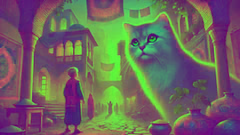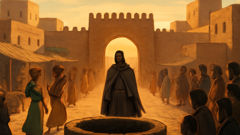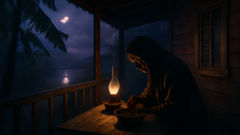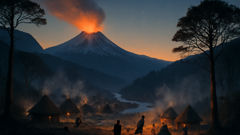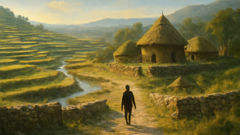Introduction
The Pombero is a presence that arrives on the breath of dusk in the red-clay villages and the marshy fringes of Misiones and Corrientes. He moves like a rumor through the caranday palms, a low whistle threaded into the hum of insects and the distant bark of dogs. To hear him is to know you are not alone: shutters will rattle, chickens will huddle together, and the last lights inside a rancho will tremble as if thinking twice about staying on. Guaraní elders and rural storytellers say the Pombero predates fences and formal names; he has watched the Paraná and its tributaries carve the earth, and he remembers when men and jaguars shared the same trails. He is small of stature, described as squat and broad-shouldered, with gnarled hands and hair like brambles, and his eyes are said to glow like the embers of a dying fire. Yet his nature bends like a reed in the wind: sometimes helpful—mending broken tools, freeing trapped hens, leaving a found seed in a hopeful child's pocket—and sometimes infuriating—tying knots in saddle girths at midnight, scattering fodder, and stealing the soles from drying shoes. The stories people tell about the Pombero are practical as much as they are poetic: treat the land and the old ways with respect, sit up a fresh offering of tobacco and honey if you want his favor, and do not tempt him with cruelty or neglect. In the villages he is invoked at the hearth like a relative, a neighbor you must placate. Yet he is also the moral weather: he reveals who will share, who will lie, and who will hoard. This tale will guide you through two nights of the Pombero's presence—one rooted in ancient memory and oral tradition, the other unfolding as a quieter, contemporary encounter—so you may understand how a spirit of the night still teaches the living to care for each other and the land.
Origins, Customs, and the Rules of Respect
In the parts of Argentina shaped by the Guaraní world, foxes and cranes have long shared the same stories. The Pombero belongs to that older conversation: a spirit born as much from the hush of swamp reeds as from the memory of human hands. To speak of origins in these lands is not to name a chronological beginning but to map a relationship. The Guaraní people call him variously Pombéro, Pombéro Karai, or simply the Pombero. Elders insist that he has no single origin story because his life is braided from many small truths—the hungry wind that slips under a door, the dry twig that snaps at a child's feet, the unexpected laugh that erupts from the hearth on a dark night. One legend says he was born on a moonless night when a group of men lost their way in the forest. They sat in a ring, lightless and hungry, and began to whisper to the trees for guidance. From the open earth rose a soft, rasping chuckle and then a footfall: stubby, quick, and deliberate. He took pity on them, finding a path out and returning to the trees, and because he had been helpful to those who asked with humility, the people carved him a place in their stories. Another tale remembers him as a child of the jaguar and the wind: a creature quick of step, secretive, and wily, who learned both to protect and to deceive. The Pombero occupies a sacred ambiguity. For a village family, he is a test and a teacher. Mothers will warn their children: 'If you leave the chicken coop open, the Pombero will take the hens.' Farmers will say: 'Leave a little tobacco on the sill, and he’ll help at harvest.' The rules are plain and local: never corner him, never insult his smallness, and never promise a favor you intend to break. Hospitality is the currency he understands. A modest offering—tobacco, honey, a pinch of cachaca, a warm hearth—may secure his goodwill for a season. The offerings are not bribes that chain a spirit; they are acknowledgments that life is interdependent. In return, he can be a surprising ally. Stories tell of the Pombero mending a broken wheel in the night so a family can reach the doctor, of whistle-work that guides lost children back to the path, of small gestures—untangling a rope or returning an errant calf—that make him an invisible hand of the household. But he is also an offended god of small cruelties when neglected. There are tales of a man who refused to leave scraps for the neighbors' stray dogs; that night, the Pombero visited his house and mimicked his voice to lead him into the marsh where he became lost until dawn. Another story recalls how a wealthy rancher built a fence to keep the forest out and ordered a boy to drive nests of birds from the trees. The boy lied and the nests fell; at midnight, the Pombero tied the rancher's horse so tight the animal could not move, and the family woke to the sound of hens escaping through a newly opened gate. These enforcement stories give structure to village ethics: nature and neighborliness are obligations, not conveniences. The Pombero's mythology carries practical lessons, and the rituals surrounding him are as much ecological instruction as they are superstition. He is associated with the wild creatures of the land—owls, nightjars, armadillos—and keeps a particular watch over the forests' smaller animals. Hunters who respect the quota and the seasons often pass through with a string of Pombero-pleasing phrases. Those who plunder the forest, poison its waters, or show cruelty to animals invite his temper. Over time, the Pombero's presence shaped local language and practice: certain trails are still called 'Pombero paths' where people leave offerings during droughts; children tie small bright threads to tree branches to indicate to the spirit that someone remembers the old pacts. In houses, the thing is less formal but more immediate. When a child is born, neighbors bring a pinch of tobacco and a scrap of woven cloth to the cradle as a nod to all spirits who keep vigil. If a household is generous, it may find small favors in return: eggs miraculously replenished during hard months, a lost necklace found under the hearth. But the opposite is true: stinginess grows like mold. A stingy or cruel household may wake to a door that won't stay closed, to pots that boil over, or to animals behaving as if confused and afraid. The Pombero delights in mischief that reveals character. The tales instruct that respect and reciprocity keep community and forest in fragile balance. Within these patterns, the Pombero also acts as a storyteller's device: a way to explain the inexplicable and give a moral arc to everyday life. When young men vanish into the sugarcane for a night, villagers attribute their safe return to an unspoken pact with the Pombero. When a lost child returns with a grin and mud on her knees, people tell of a soft hand guiding her. These stories are not rigid dogma—they are flexible talismans against certainty. They remind listeners that the night carries both danger and grace, that the land remembers those who forget it, and that the smallest courtesies can alter fate in ways seen and unseen.

The customs surrounding the Pombero differ from place to place but always emphasize small acts with big consequences. Tobacco, often home-grown and rolled by hand, is an offering of recognition. Honey represents the sweetness of shared labor. A drop of rum or cachaca is respect in liquid form. Offerings are placed in corners or on windowsills—humble, private acts rather than public ceremonies—and they serve to open a mutual line of negotiation rather than to summon a binding contract. Hosts often leave these offerings after a quarrel or a harvest, asking the spirit for patience or blessing. Sometimes, if a family suspects they have angered the Pombero, they will re-tell his stories to the children and leave an offering for three nights in a row; the idea is to restore balance. In this way, the Pombero functions less like a deity demanding ritual and more like a neighbor whose favor is earned through consistency. He enforces the social contract in a world where law is thin and the forest silent. He is thus both communal conscience and guardian of the wild. Scholars who study Guaraní cosmology note that spirits like the Pombero are not anomalies but parts of a living system where humans, plants, and animals exchange power and obligation. That system persists in the landscape—through paths, boundary markers, and the way people speak to the wind. Even in contemporary times, when roads are paved and radios hum in the background, these practices persist because they attend to relationships that institutions often overlook: human-to-human, human-to-animal, human-to-wild. In a region where the river can swell without warning and seasons are unpredictable, the Pombero's rules are pragmatically useful. Respect, reciprocity, and hospitality become survival strategies disguised as lore. And because the Pombero can be both friend and foe, villagers learn a particular humility: every action has echo, and the night keeps tally.
A Night with the Pombero: Mateo, Doña Carmen, and the Choice of Kindness
The village of San Isidro sat near a brackish lagoon where morning mist pooled like pale cloth. Houses leaned into each other for comfort, painted in sun-peeled pastels and ringed by low fences of thorn. Don Ernesto’s ranch was a stone's throw from the main road; he was a prosperous man with a prideful jaw and a habit of thinking his money could buy order where the forest disagreed. Across the path lived Doña Carmen, whose hair was the color of river clay and whose laughter always had a remnant of a song. Her grandson, Mateo, was an energetic boy with a curiosity in his eyes that sometimes frightened adults with how it refused to be tamed. When the drought came early one year and the lagoon shrank to a mirror of mud and salt, people in San Isidro worried. Cattle grew lean. Chickens stopped laying. The air tasted of ash and longing. The elders said the Pombero grumbled when whole swamps were taken and when folks forgot to leave the small acts that kept the balance. Doña Carmen, who kept to the old habits, left tobacco and a single coin of honey on the windowsill every night. Her animals were thin but steady, and people who passed her house reported seeing a mysterious extra pair of footprints crossing her threshold in the morning—small, deep, and as if someone had hopped on two feet. Don Ernesto, meanwhile, thought the old ways were silly. He had bought new pumps and machines and ordered men to clear a stretch of forest to expand his pastures. When the workers cut an old tree where a bird of striking red and blue nested, an argument broke out, and the men laughed at the old woman's rituals. They said she was imagining favors from a creature that wore the night like a blanket. One night, Doña Carmen’s little lamps had burned low when Mateo ran across the path to her house, breathless with an idea. He had found a nest under a thistle where squabs had fallen and wanted to return them. Doña Carmen hummed, smoothed the birds into a nest woven from an old apron, and whispered a story into his ear about the Pombero's patience. 'Leave a pinch of tobacco near the nest, niño,' she said. 'Tell him you mean well and you won't take what does not belong to you.' Mateo's fingers trembled; he placed the tobacco and then, in a rush of childish bravery, knocked on Don Ernesto's door to return a piece of wire he'd found. The rancher, flaring with the heat of his own opinion, swatted the boy away. 'Mind your place,' he said, and slammed the door. That night, as the village pulled its shutters against the sky, a low rustling threaded the lanes. Don Ernesto's dogs barked until the sound died away into hoots and croaks. The men at the ranch woke at midnight to find the horses restless. Some of the saddles were knotted as if a hand had gone over them and twisted every strap into impossible loops. A calf had been led in a zigzag that left hoofprints like questions across the yard. They blamed the boys, blamed one another, and then blamed the night. Across the path, Doña Carmen slept with a charred matchbox under her pillow and a warm pot of mate beside the bed. In the morning, she discovered a handful of maize seeds placed at her millstone. She smiled at the Pombero's small generosity. Mateo, meanwhile, had his own encounter. Restless, he wandered near the marsh where reeds brushed his knees and a sky like a bruise hovered overhead. He followed a soft whistle and found a crouched figure near a fallen log—small, rough, shoulders like a bar of driftwood, hair tangled with leaves. The figure's face was not cruel; its mouth was a wound of laughter. The Pombero did not speak like people but like wind circling straw. He took Mateo’s hand in a palm that smelled faintly of tobacco and clay and clapped it once, tapping the boy’s heart like a drum. Mateo remembered how Doña Carmen had told him to be honest and to share, and he remembered the shape of the birds' soft breath. 'We do not own the forest,' he heard, not in words but in a pressure of thought. 'We borrow.' The next dawn found Don Ernesto fuming. His men had found their saddles tangled and some tools hidden in the reeds as if playful hands had made them toys. The rancher swore revenge. He vowed to find the mischief-maker and had his workers break open the thatched roof of an old hut where the children kept their kites. At the same time, the village elder, Señor Alvarez, called a meeting. 'If the Pombero is upset,' he said quietly, 'it is because we have been careless. We have torn where we should have mended.' They discussed offerings. They decided to gather tobacco from gardens and a honeycomb from the apiary to put together a communal plate. Mateo wanted to carry the plate. Don Ernesto spat but did not stop them. The group walked toward the woods as the light thinned, carrying the small pan of sugar and tobacco. At the edge, Doña Carmen placed a stick of sugarcane and two coins of honey on a root and whispered an old phrase asking forgiveness for what they had taken, promising carefulness in the future. The Pombero watched, perhaps amused, perhaps relieved. He unknotted one of the saddle straps back in the night before dawn, so the horses would be loose but unharmed. He coiled the bits of wire into a tidy pile where they could be found. He left a single feather at the house of the boy who had been kind to the fallen nest. Don Ernesto, however, was not satisfied. He demanded someone be found who had 'done' this to his property. In his anger he bound one of his men's arms in a crude knot of rope, but in the morning the man awoke free and smiling, as if he had slept without knowing the weight. Don Ernesto's rage turned inward. When the village's rain finally came, it did not come uniformly. The parcels of land that had honored the old pacts drank longer and greened first; Don Ernesto's newly cleared field drank less and caked with salt. He found that the earth in the cleared patch refused to hold roots. The people whispered that the Pombero's help had been given elsewhere. Don Ernesto's anger cooled into a stubbornness that matched the season. One evening, after a private argument with his conscience, he left a small coin beside his shoe and a pinch of tobacco. It was not a big admission, but it was a start. The Pombero's response was quiet and measured: the rancher's old dog stopped shivering in the night, and in the morning a bluebird nested by his kitchen eaves. Mateo, who had learned the measure of listening and the pleasure of small courtesies, kept his eyes open for the Pombero. He would not always see him; sometimes it was only the feeling of being watched without menace, a hand that moved a lost earring from under a thorn to a place where it could be easily found. On a later night when the moon hung low and the lagoon reflected a silver coin, Mateo chased fireflies across the quay. He called, softly, to the sound of the Pombero's whistle and heard, for an instant, the answer in a rustle of grass. It was a recognition between two beings—one human, young and learning, the other a creature of habits older than the first fenceposts. In the months that followed, the village practiced its modest rituals more faithfully. They left the small offerings and mended what they had torn. Don Ernesto, whose pride had been worn thin by empty fields and the patience of his neighbors, softened in ways that felt like a small miracle: a loaf of bread left at Doña Carmen's gate, a hand extended to help a neighbor mend a roof. The Pombero did not reward with riches. His gifts were steadier: a calf that did not fall ill, a crop that returned a little better than expected, a lost child's laughter carried home by an unseen guide. The real reward was the return of neighborship and a new shape to listening. Tales of the Pombero's mischief persisted—shoes stuffed with mud, whispers in the rafters, a sudden, disconcerting smell of toasted herbs—but they were balanced by stories of the spirit's small graces. People learned to measure their actions; they learned to think of the forest as a partner rather than an obstacle to be cleared. For Mateo, the lessons were simple and luminous. He learned to tie a knot that held under stress, to observe the way wind moves through reedbeds, to leave a coil of tobacco for a thankful hand. He learned that being kind was not merely sentimental but protective. In the years that followed, that village would tell the story of a boy who once gave shelter to a fallen nest and found that kindness had a reciprocity older than law. It shaped his life: when he became a teacher, he encouraged his students to tend to the small things—mending a neighbor's fence, sharing a piece of bread, keeping watch over the lagoon's edge. Those small attentions, the teachers said, were the village's real infrastructure. The Pombero remained elusive and, in his elusiveness, indispensable. He reminded people that some debts were paid in tobacco and patience rather than in coins. He remained, above all, a lesson written in the language of the land.

Conclusion
Stories like that of the Pombero persist because they speak to a truth many modern accounts try to sidestep: human communities survive by honoring relations that are not listed in ledgers. The Pombero is an old contract enacted nightly, reminding those who will listen that kindness and restraint carry weight. He also offers a practical theology: small rituals—tobacco on a sill, an honest apology, the return of a stray egg—are actions with consequences. In contemporary Argentina, where highways cut through former wetlands and radios hum in the background of those same reedbeds, the Pombero remains a cultural anchor. He is a sign that some knowledge travels by breath and story rather than by statute—a way to teach children how to live on land that gives and takes. To encounter the Pombero is to be invited into a conversation about limits and gifts, about how a community cares for its weakest and smallest members. Treat him with neglect or arrogance and you may meet a night of tricks and discomfort; treat him with respect and you may find doors that open when you most need them. The old narratives also perform another task: they keep a memory alive that connects people to place. A name said aloud—Pombéro—ties the present to an older map of the world in which animals, plants, and people are interdependent. That memory is practical as well as poetic; it keeps watchers vigilant across seasons and warns against the overreach that has hollowed many a landscape. The Pombero's legend is not a relic to be dismissed but a living practice of reciprocity. It asks only for small courtesies and a willingness to listen. If you ever find yourself in a village by a lagoon in Misiones or Corrientes, and the dusk draws long and the world narrows to the sound of frogs and a single evening star, remember the old pact: leave a pinch of tobacco on your sill, pour a drop of honey for what you cannot explain, and, when a child finds a fallen bird, teach them to mend it. Such acts are not superstitions so much as ways of keeping the community's heart beating. The Pombero, in his mischief and his mercies, will answer in the only way he knows: by testing you, teasing you, and sometimes, if you have been careful, by helping you find what you thought was lost.






